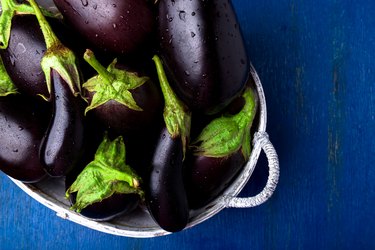
Some people have a sensitivity to nightshade vegetables and fruits, which means they are unable to digest them fully. If you have a nightshade sensitivity and eat nightshades, you may experience a variety of unpleasant symptoms.
But what exactly falls under the category of nightshades? Nightshade vegetables and fruits belong to the family of Solanaceae plants of the Solanum genus, according to the U.S. Forest Service. This group of plants contains more than 2,000 species that are widely used as food and medicine. Below is a list of common nightshade vegetables and fruits that you should avoid if you suspect that you have a nightshade sensitivity or intolerance.
Video of the Day
Video of the Day
Tip
When you have a nightshade sensitivity, you are unable to fully digest the nightshade vegetable or fruit, leading to digestive complications and other symptoms.
1. Potatoes
Potatoes are part of the nightshade family. This includes white, red, yellow and blue-skinned potato varieties. However according to the University of California, San Francisco sweet potatoes and yam are not nightshades.
If you have a sensitivity to members of the nightshade family, you should avoid the obvious foods made from potatoes like mashed potatoes and french fries, but also be sure to read ingredient lists on all processed foods to avoid potatoes and potato starch.
2. Tomatoes
Another widely consumed member of the nightshade family is the tomato, according to Colorado State University. Although people often refer to the tomato as a vegetable, scientifically, it falls into the category of fruit.
If you have a nightshade sensitivity, it's best to stay away from all raw tomatoes and also from cooked tomatoes in foods like pasta sauce and ketchup. Be sure to read the ingredient lists on soups and condiments such as hot sauces, barbecue sauces and marinades, because they often contain tomatoes.
3. Peppers
All peppers belong to the Solanaceae family. This includes common ingredients like bell peppers, jalapeños, habaneros, cayenne peppers and paprika. Paprika, a spice made from ground, dried peppers is used in a variety of cuisines.
Be sure to read labels and communicate well with servers and chefs when eating out to avoid the ingredient. Peppercorns, on the other hand, are not a member of the nightshade family.
4. Eggplants
Eggplant appears in Italian, Thai, Indian and other cuisines, and even though you need to avoid eating eggplant if you have a nightshade sensitivity, you can easily avoid dishes that contain eggplant.
If you are ordering a meal that contains mixed vegetables, be sure to communicate to your server that you cannot eat eggplant and other nightshades. When in doubt, it's best to avoid a food or dish altogether if you have an allergy or sensitivity.
5. Tomatillos
Tomatillos, another member of the nightshade family, are often used in Mexican cuisine in dishes like chile verde and salsa verde. Tomatillos have a papery husk and the fruit hangs like small round paper lanterns from the plant. Tomatillos are typically picked when they are still green and used to lend a citrusy tartness to dishes.
6. Goji Berries (and Other Berries)
Goji berries fall into the nightshade family, according to PennState Extension. These slightly sweet red berries, sometimes called wolfberries, are native to Asia. They can be eaten raw, dried or made into a juice. They're easy nightshades to avoid, but be sure to read the ingredient list of all juices, smoothies, teas and nutritional supplements to be sure they don't contain goji berries.
Other berries in the nightshade family include garden huckleberries, ground cherries and cape gooseberries, but not normal gooseberries or blueberries.
Read more: Allergies to Nightshade Vegetables
Is this an emergency? If you are experiencing serious medical symptoms, please see the National Library of Medicine’s list of signs you need emergency medical attention or call 911.